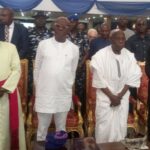
The PUNCH had reported that the Tribunal, on April 15, 2023, dismissed the petition against the Independent National Electoral Commission as the first respondent, Dapo Abiodun as the second respondent and the All Progressives Congress as the third respondent on the ground that the debrief counsel asked for discontinuation and withdrawal of the petition.
NNPP said it was appealing the ruling because the judges that heard the case erred in their judgement.
In its appeal filed on May 22, 2023 on the suit No: EPT/OG/GOV/01/2023, the NNPP, through its counsel, Isaac Izunya, informed the Court of Appeal sitting in the Ibadan Judicial Division that it was dissatisfied with the unanimous judgement by the three judges.
Reiterating its position as contained in the petition No. EPT/OG/GOV/01/2023, of April 15, 2023, it averred that: “The learned justices erred in law when they unanimously held that by article 27.18 (iii), (v), and (vii) of the constitution of New Nigeria Peoples Party (hereinafter called NNPP), the National Legal Adviser of NNPP cannot take over the appellant case, brief another counsel and debrief the counsel on record, Peter Ogah, from further representing the party.
“That by Article 27.18 (iii), (v) and (vi) of the constitution of NNPP, the National Legal Adviser of the party is empowered to attend to all litigations and legal defence on behalf of the party at all levels, including its organs and coordinate the activities of legal advisers at all levels on legal matters affecting the party.
“That the learned counsel on record, Peter Ogar being engaged to represent the appellant by an organ/branch of the appellant, is by virtue of the constitution of the appellant under the control and supervision of the national legal adviser of the appellant.
“That Section 36 of the 1999 Constitution (as amended) 2018 provided and recognised the right of the appellant to debrief and brief another counsel at any time of the proceeding.
“The learned Justices of the tribunal erred in law when they allowed learned counsel, Peter Ogar, to successfully withdraw the appellant’s petition and dismissed same when the provisions laid down by the Electoral Act, 2022 for the withdrawal of petition has not been complied with.
“Section 30 (1) (a) & (b) of the Electoral Act, 2022 clearly provides that before leave for withdrawal of an election petition can be granted, each of the parties, in this case all the respondents, shall produce an affidavit stating that no agreement or terms of any kind has been made and no undertaking has been entered. That the withdrawal of the appellant petition was done without the affidavit required by electoral Act.
“The learned Justices of the tribunal erred in law when they allowed the learned counsel to move motion for withdrawal of the appellant’s petition despite a protest letter of un-authorization of withdrawal of petition dated on the 27th day of April, 2023 and filed on the 29th day of April, 2023 written by the appellant herself through the National legal adviser.
“That the appellant name is on the petition and not the lawyer’s name. That the appellant is the litigant and the person whose name appeared on the process of the court and therefore the Chief Executive Officer and driver of her case, who drives and determines what and how the case should proceed.”













